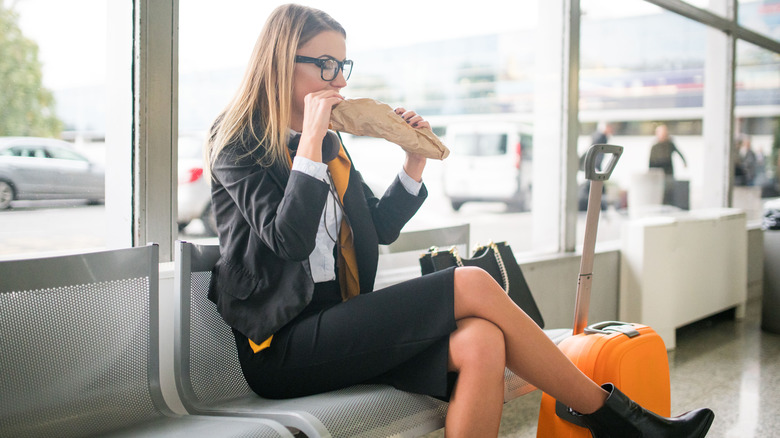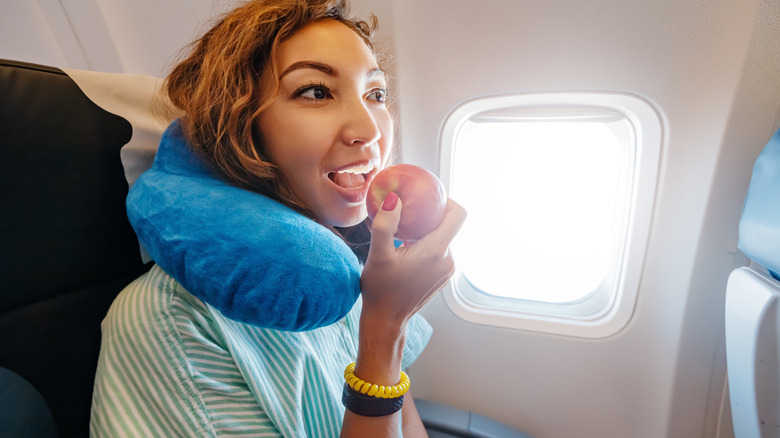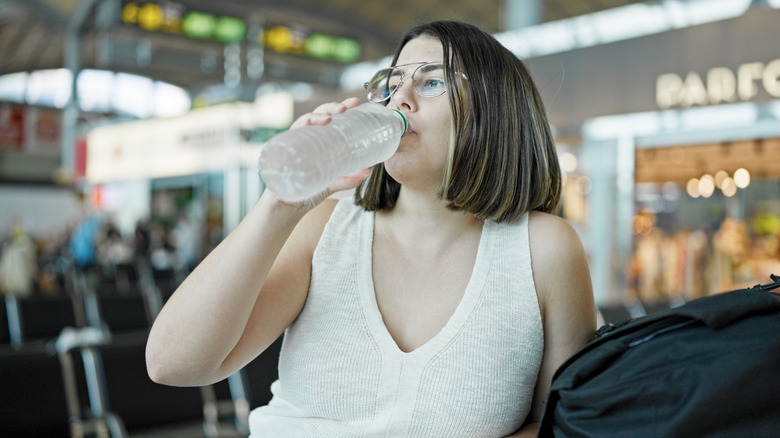The Secret To Surviving Ultra-Long Flights Starts With What And When You Eat
Whether you're flying across the country or heading overseas, most travelers understand the importance of things like checking in online and even packing an extra layer for those ultra-long flights. However, in between the packing lists and flight schedules, traveling well isn't just about comfort — it's also about looking after yourself. And despite what those strange airport cravings might be calling out for pre-boarding, making the right food and drink choices pre-flight can significantly impact how you feel both during and after your journey.
From fatigue and bloating to muscle stiffness, long-haul travel has some pretty bizarre effects on the human body. Which, let's be honest, isn't that surprising — especially considering the fact that you're basically required to sit inside a pressurized cabin for hours on end. Throw in changing time zones and disrupted sleep patterns, and you've got a recipe for all things discomfort.
Thankfully, our bodies are also incredibly resilient and can quickly adapt to changes when pushed in the right direction — and that's exactly where pre-flight nutrition comes in to help. From stocking up on nuts and fruits to ditching alcohol and caffeine, feeding your body the nutrients it needs to thrive (as much as possible) inside a plane can make a significant difference in your travel experience.
The best foods to eat before an ultra-long flight
When it comes to ultra-long flights, planning your meals ahead of time is essential for managing comfort and energy. First, you'll want to make sure you eat three to four hours before your flight. As for what to eat, focus primarily on slow-release carbs (whole grains, legumes, and sweet potatoes) and lean proteins (turkey, grilled chicken, tofu) that can help regulate your blood sugar levels, maintain your energy, and reduce the effects of jet lag before it kicks in.
Once mid-air, you're also going to want to have smart snacks for the journey. Specifically, things like trail mix, fresh cut fruit, and even protein bars can help support your digestion, relieve muscle cramps, and keep you feeling satisfied. Meanwhile, and although it might seem tempting, stay away from sweets and salty snacks. While sugar can cause energy crashes, snacks high in salt can ultimately cause you to hold onto water — and make for a pretty uncomfortable trip.
Lastly, along with mindful eating and snacking, drinking lots of water while flying (herbal tea also does the trick) will help you stay hydrated and alert, and save you from potential headaches and fatigue. Oh, and whatever you do: Don't get tempted by the in-flight booze! While sky-high wines might sound great at the moment, alcohol can disrupt your body's natural adaptation to high altitude, as well as decrease your blood oxygen levels, increase your heart rate, and make it harder to get quality sleep — not to mention speed up dehydration. And, while we're at, you might as well skip the coffee on your next flight too.
What to eat after landing to beat jet lag and fatigue
Landing after a long-haul flight can often leave you feeling pretty disoriented. After all, your body has just spent hours adjusting to different air pressure and disrupted sleep patterns, all while working overtime to maintain its normal functions — which ultimately explains why you're usually so hungry after long flights. Nonetheless, this doesn't mean going ham on airport fast food.
For a natural energy boost that won't cause crashes, choose antioxidant-rich foods that can help with recovery. For example, a cup of matcha can provide sustained energy for several hours; meanwhile, dark chocolate and bananas will help ease muscle tension from all that sitting. If your stomach feels a little rattled, try some warm ginger tea or ginger chews to help with digestion.
Most importantly, though, always hydrate after a long-haul flight. Plain ole water will do just fine, or feel free to throw in some lemon if you have easy access to it. Ideally, sticking to caffeine-free beverages for the first few hours after landing will give your body plenty of time to rehydrate and adjust before introducing any other stimulants into your system.


